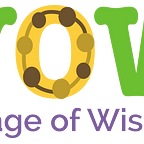#VOW2Discuss: Parent Highlight Wendy’s Family
Written By Amber Harris, Originally published March 8, 2015
We a really excited to share the words of wisdom Wendy a mother of three Black boys: Mosheh (17), Asher (14), and Caleb (11), has blessed us with related to wrapping her sons in the love necessary for them to thrive. Wendy and her husband were the first parents nominated for the #VOW2Discuss award. Wendy was kind enough to share with VOW how she and her husband make sure that their boys find confidence and pride in their Blackness. Check out the interview below.
Generally, how do you talk to your kids about race?
Wendy and her husband focus on Blackness as a point of love of self and honor of God. We are all, she says “a reflection of God’s magnificence”. At her house, race isn’t something to talk about in the context of oppression or racism, per se. Though systemic oppression is a reality for many subgroups, including black people, they shape the conversation around the resilience of a people rather than the hatred of the oppressor. She discusses race with her kids as heritage and celebration, beauty and individuality. “We all come in different shades, we’re all unique, we all have a purpose and we’re all very special,” she stresses.
“We all come in different shades, we’re all unique, we all have a purpose, and we’re all very special,”
Obviously, there are times when discrimination or prejudice has to be discussed and she’s honest with her three boys about the obstacles Black people have been faced with, but makes the POINT of her conversations excellence versus ignorance. The reality is that racism is a display of ignorance and being excellent always wins in the battle over ignorance. So, the standard set in their home is one of excellence in spirit, academics, behavior, and relationships. She feels that true honor of self, yields honor and respect from others.
What questions about race have your children asked that you weren’t prepared for?
None. Wendy is proactive with her kids about race. Because of the emphasis on the root cause of any “isms”, her children are aware of the discrimination that many groups, including Black males, endure. Books and documentaries that permeate with present day and historical truth followed by family roundtable discussions are a staple in their home. The issue is so often discussed and analyzed in her house, her kids are generally able to answer their OWN questions. There hasn’t been a point where she felt at a loss when discussing race with her sons.
What do you think is most important for your kids to know about race and why do you think it’s necessary that your child find confidence in being Black?
Wendy works as a teacher in a public high school. She sees first-hand the effects of children lacking confidence and a strong sense of identity leading them to try to fit into a mold not made for them. She put it eloquently:
“Lack of self-awareness can really disrupt a child’s identity. Rejection of self or not loving yourself is rejecting how God made you. When your identity is dismantled you try and identify with others and ask them to accept you as one of them and they can’t/won’t because you’re not.”
She feels it is important for her kids to embrace their rich culture and learn about other cultures as well; encouraging other ethnic groups to appreciate who they are and who we are as a human race.
What would you tell other parents to convince them to have conversations about building their child’s racial identity or racial confidence?
Wendy talked about the importance of instilling a since of racial confidence in your children early on. She parents under the premise that you can’t be happy with anything unless you’re happy with yourself. She advocates for talkin to your kids about race, excellence, and ignorance early. Teach them that they are amazing, talented, beautiful, unique, and gifted with a purpose — and teach them that we all are. Teach them they that are not meant to be like everyone else and they don’t have to conform to what people are doing around them — be the example, not the follower. Teach them to love their skin, their hair, their facial features, their bodies. Teach them to respect themselves FIRST, so that others will have no other choice but to respect them. Teach them to be conscious about the forces that work against them so they can be a part of the revolution of rebuilding a community that has been tormented by hatred for hundreds of years. Prepare for their questions. It’s easier to be proactive than reactive.
Tell us about a moment when you know you made the right decisions about having the tough conversation with your child about race?
Wendy shared a story about her oldest son, Mosheh. Mosheh went to predominantly white high school where he was often the only Black student in class. There wasn’t a lot of representation of Black culture/heritage/ intellectuality in his school. Since graduating (early!) Mosheh has demonstrated a strong sense of pride in his Blackness. He’s developed a particularly Afro-centric style and seeks out literature by Black writers from all arenas to supplement his education. Obviously, Wendy’s conversations have proven to be fruitful. He has a love for all people, but he appreciates who he was created to be — a strong Black man.
